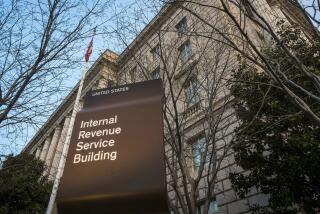Tax Protester Is Proud of Fight He Lost With IRS
- Share via
His ancestors on his mother’s side fought and died in the Revolutionary War; those on his father’s side were killed in the service of Union forces in the Civil War. William C. Burns of Costa Mesa considers himself a veteran and a patriot too, but not because he spent three years serving in the Air Force.
Bill Burns is a casualty in the war against the tax system.
Convicted in 1979 of three misdemeanor counts of willful failure to file income tax returns, Burns was the first member of the Garden Grove-based Your Heritage Protection Assn., once the nation’s largest tax protest group, to be successfully prosecuted. Although his three-year prison term was eventually suspended, Burns spent six months paying off almost $5,000 in back taxes, penalties and interest. (His attorneys’ fees and $2,000 criminal fine were paid by the association.)
“They haven’t changed my mind at all, no matter what I went through,” Burns, 49, said of his experience.
“There were nights when I broke out in sweat; there were plenty of times I cried like a baby. It really hurt. The stress was so heavy when they put the federal levy on me--it was such a threat to my survival--that even when I went to the toilet I would defecate blood.”
Burns maintains that the prosecution tampered with his case, “misplacing” key exhibits for his defense, although the Internal Revenue Service denies doing so.
During the months he was paying his taxes for the years 1975 through 1977, Burns says the IRS took so much out of his paychecks that he was left with just $50 a week.
He also was required to devote 1,000 hours of community service over his five-year probation period. Under such stress, Burns said he quickly dropped from a robust 225 pounds to 180 (“probably the only good thing that happened”).
His life is more sedentary these days. He completed his probation satisfactorily and files his federal tax forms each year--although he writes “signed under duress” next to his signature. Although he still stands by his principles, he says, he has retired from active protest of the income tax, preferring to spend many of his evenings quietly supping in a Newport diner.
Ironically, Burns is a public employee and has drawn regular paychecks since 1959 from Newport Beach for his job as an equipment operator in the city’s maintenance department since 1959. He dismisses the apparent contradiction by pointing out that cities derive most of their revenues from property and sales taxes and that the United States did “just fine” without an income tax for more than a century.
“I look at (the conviction) as an achievement; I did my part,” said Burns, who sports long hair and a bushy beard and dresses in jeans, denim jacket and Vietnam-style Army jungle cap.
Still, thanks to his car--a 1956 Ford whose license plate reads “TAX REB”--he can hardly avoid talking about his beliefs.
“I don’t go out and promote it, even though my car still shows how I feel about things,” he said. “I can’t take the car out of the parking stall without someone reading the bumper stickers. . . . I try to tell people about it, and they look like I’ve flipped my cork. It’s very difficult to get people to look at it, which is typical of any time you try to tell people the truth.”
Burns first got involved in the tax protest movement when he attended a seminar on the IRS by a tax protest group in 1975. Intrigued by what he was told, he did a little research of his own and decided a month later to stop paying income taxes.
“I never liked the IRS or the income tax, and when I found out it was voluntary and it was totally unconstitutional. . . . I decided I had to get involved and do something about it. So I got involved for patriotic reasons. My involvement was not for having a fatter paycheck.”
Burns’ ideal is a government that would return to the gold standard and eliminate the income tax. He is enough of a realist, however, to admit that that scenario is unlikely. Meanwhile, Burns takes pride in what he has done.
“I stood up to them,” he said. “I wear the fact that they took me to court as my badge of honor. . . . They didn’t plow me under. I’m still here, and they didn’t change my mind.”
More to Read
Sign up for Essential California
The most important California stories and recommendations in your inbox every morning.
You may occasionally receive promotional content from the Los Angeles Times.













